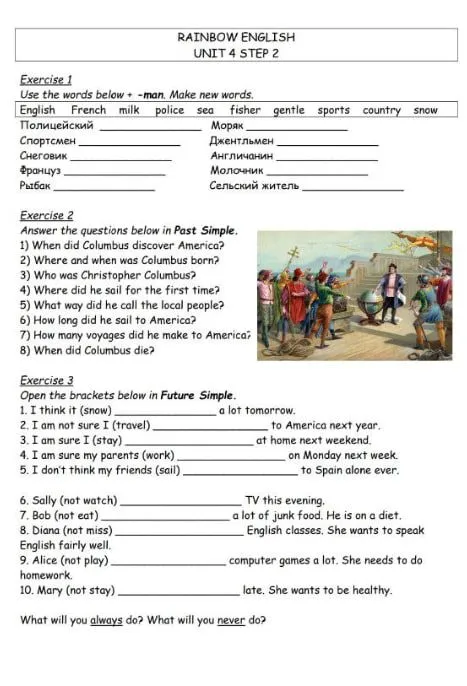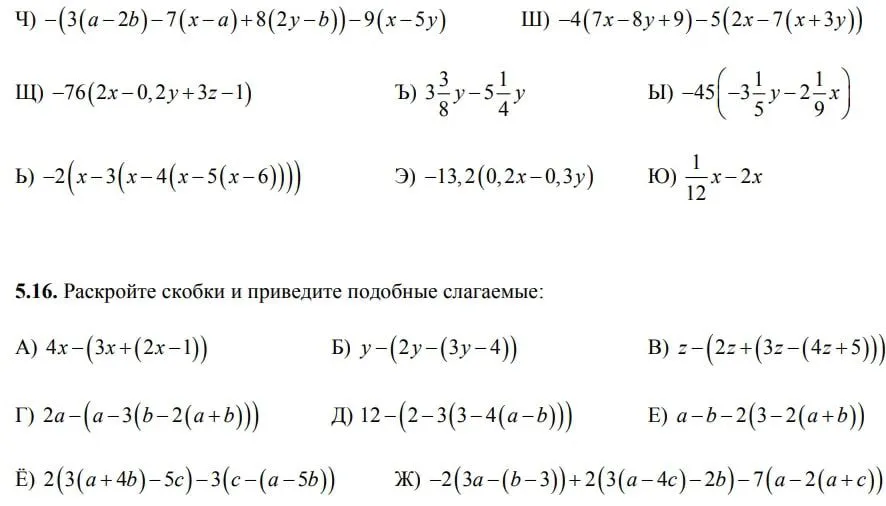Создать
Мой контент
Аккаунт
Каталог
Система
Приложение и соцсети
Правовая информация
Наши проекты
×
![]()

Exercise 1: Choose the right answer in the dialogues
1) "I won the first prize! My essay is the best!"
→ Great (This is a positive achievement, so 'Great' is more appropriate than 'Fairly bad')
2) "My sister fell down and broke her leg. She can't walk now."
→ Not bad (This is incorrect - for bad news, 'It is a pity to hear' is more appropriate)
3) "Do you like films about space and planets?"
→ Fairly good, but I like films about animals more (This shows a preference while acknowledging the topic)
4) "I am going to New York next month."
→ Great (This is exciting news, so 'Great' is more appropriate than 'Bad')
5) "It is going to snow all day long."
→ Fine (Since they planned to go skiing, 'Fine' is more appropriate than 'Fairly bad')
Exercise 2: Complete the sentences with the new words
Let's fill in the blanks using the given words: discover, discovery, gold, land, round, sail, sure, voyage
Exercise 3: Open the brackets in Past Simple
Christopher Columbus (discover) discovered America in 1492. He (be) was born in 1451 in Italy but he (live) lived in Spain for a long time. Columbus (be) was a seaman and (make) made many sea voyages. During that time, seamen (sail) sailed east to Asia and (come) came back rich people because they (bring) brought gold and riches of India and other Asian countries. Columbus (be) was sure that our planet is round so he (sail) sailed west to reach India. He (see) saw an island after three weeks of his voyage. It (be) was situated in Central America but Columbus (think) thought that people who he (meet) met were Indians. Christopher Columbus (die) died in 1506. His discovery of America is one of the most important discoveries in history.

Exercise 1: Word Formation
Давайте образуем новые слова, добавляя суффикс -man к предложенным словам:
Обратите внимание:
- Суффикс -man используется для образования существительных, обозначающих профессию или национальность
- При добавлении суффикса написание основного слова обычно не меняется
Exercise 2: Christopher Columbus Questions
Ответы на вопросы о Христофоре Колумбе в Past Simple:
Exercise 3: Future Simple
Заполним пропуски, используя Future Simple:
Правило:
Future Simple используется для:
- Предсказаний о будущем
- Спонтанных решений
- Обещаний и намерений
- Действий в будущем, которые мы не можем контролировать

Задание 5.16
Раскроем скобки и приведем подобные слагаемые для каждого выражения.
А) $4x-(3x+(2x-1))$
Решение:
1) Сначала раскроем внутренние скобки: $4x-(3x+2x-1)$
2) Упростим выражение в скобках: $4x-(5x-1)$
3) Раскроем оставшиеся скобки, меняя знаки: $4x-5x+1$
4) Приведем подобные слагаемые: $-x+1$
Б) $y-(2y-(3y-4))$
Решение:
1) Раскроем внутренние скобки: $y-(2y-3y+4)$
2) Упростим выражение в скобках: $y-(-y+4)$
3) Раскроем скобки: $y+y-4$
4) Приведем подобные слагаемые: $2y-4$
В) $z-(2z+(3z-(4z+5)))$
Решение:
1) Начнем с самых внутренних скобок: $z-(2z+(3z-4z-5))$
2) Упростим: $z-(2z+((-z)-5))$
3) Продолжаем раскрывать: $z-(2z-z+5)$
4) Упростим в скобках: $z-(z+5)$
5) Раскроем последние скобки: $z-z-5$
6) Окончательный ответ: $-5$


Используйте Homiwork как обычное приложение. Это удобно!
Добавить на главный экранИспользуйте Homiwork как обычное приложение. Это удобно! Откройте меню Safari и нажмите 'Добавить на главный экран'.


Эта функция доступна только для пользователей с Прайм статусом
Высококачественные решения от нейросети с подробными объяснениями и визуализациями доступны эксклюзивно для пользователей с Прайм статусом.

Начав пользоваться сервисом, вы принимаете: Условия использования, Политика конфиденциальности, Политика возвратов
